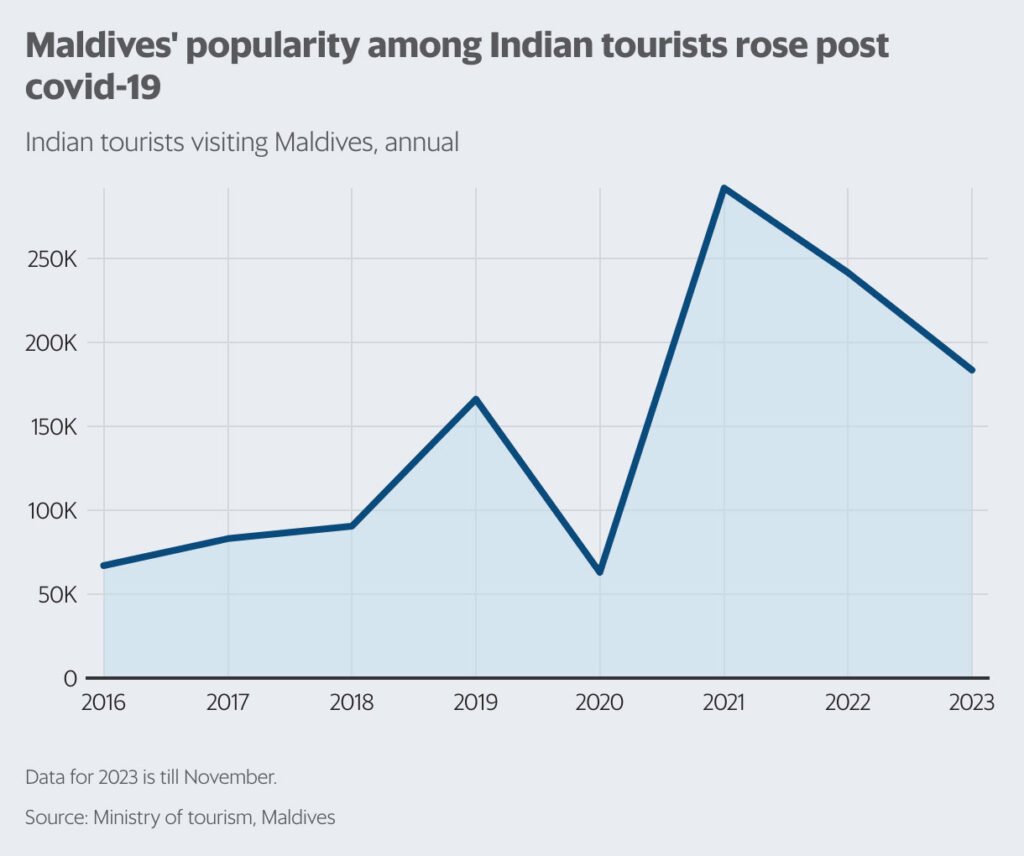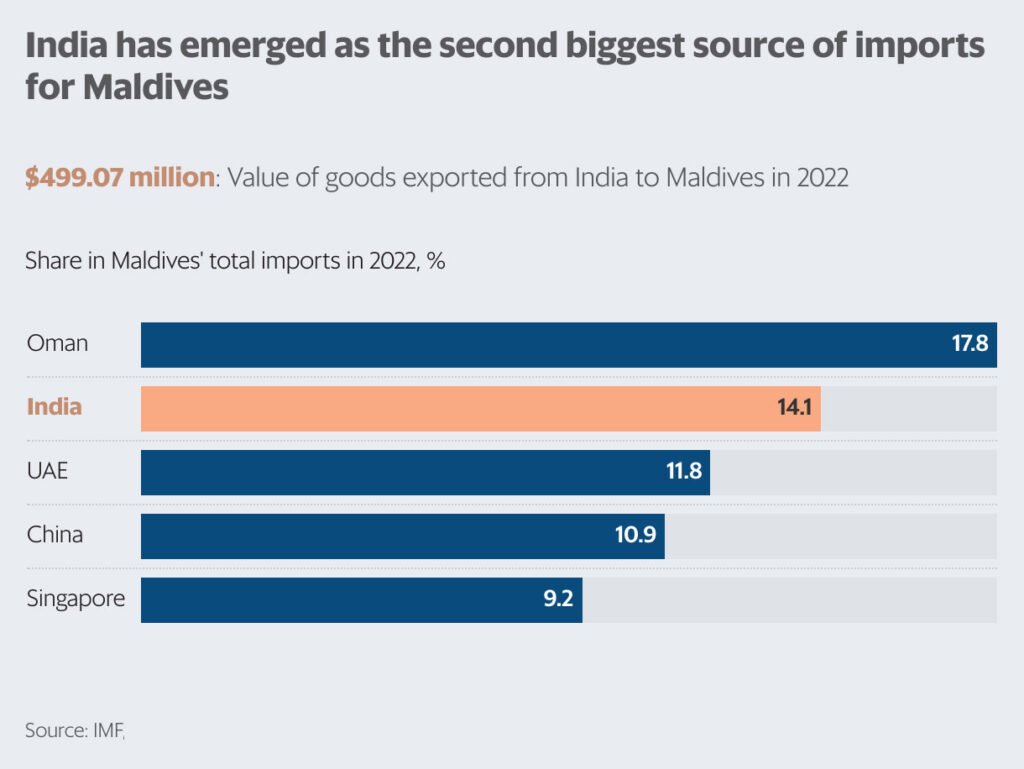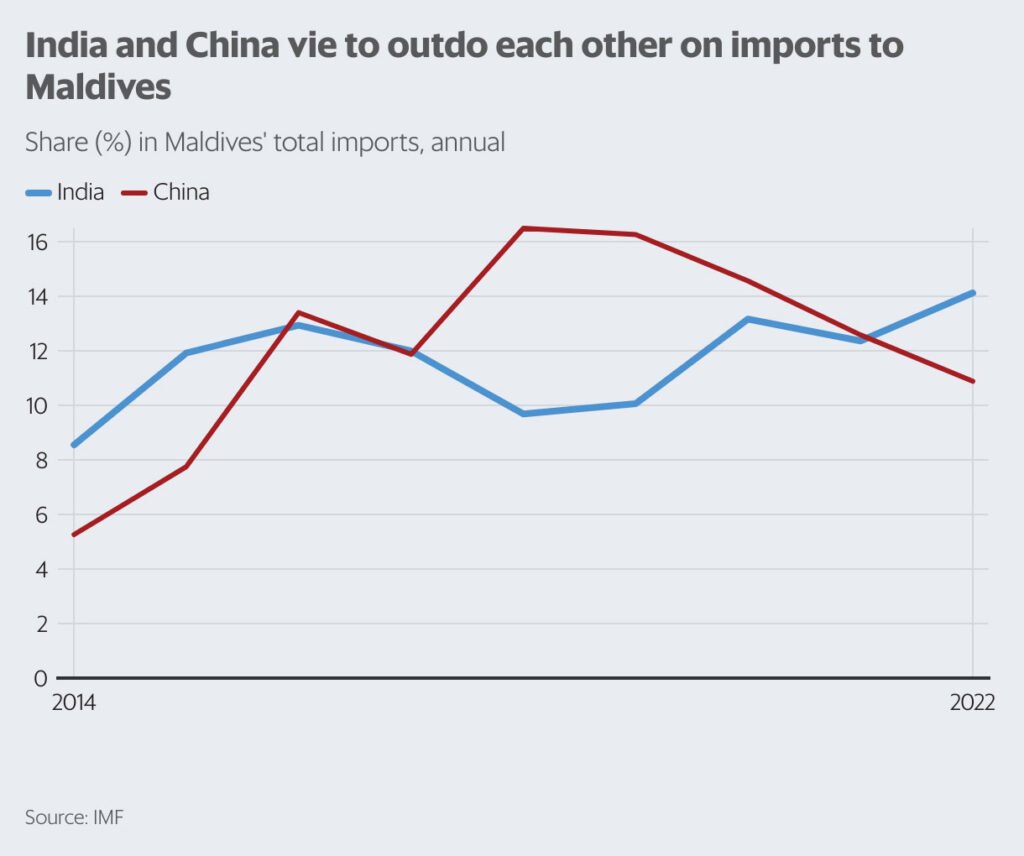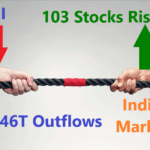Diplomatic tensions arise between India and Maldives following controversial remarks about Prime Minister Narendra Modi by three Maldivian ministers, leading to calls for boycott from Indian social media users.
A Controversial Spark:
A controversy ignited online has rapidly evolved into a diplomatic confrontation, resulting in strained relations between India and Maldives. The conflict erupted when three Maldivian ministers, since suspended, made disparaging remarks about Prime Minister Narendra Modi. This led to a strong backlash from India, and some Indian social media users are now advocating for a boycott of the Maldives. These actions have the potential to significantly impact the robust trade and interpersonal bonds shared between the two nations.
Deteriorating Diplomatic Relations:
The brewing tension has placed a strain on the historically strong ties between India and Maldives. The derogatory comments directed at Prime Minister Narendra Modi by the Maldivian ministers have exacerbated the situation, fueling an upsurge of discontent within India. The resulting social media uproar has added momentum to the conflict, amplifying the calls for a boycott of the Maldives.
Impact on Bilateral Trade:
India has been an instrumental contributor to the Maldives’ tourism sector, exemplified by the significant influx of Indian tourists to the country. Notably, India ranked as the second-largest source of tourists, with 183,371 visitors during the initial 11 months of 2023, based on the latest available official data from Maldives. The consequential actions undertaken by some Indian social media users may reverberate across the trade dynamics, potentially impacting existing trade and tourism ties between the two nations.
The current escalation in tensions underscores the delicate nature of India-Maldives relations. As the diplomatic standoff unfolds, it is essential for both nations to navigate the situation tactfully and work towards mitigating the escalating discord. Leveraging diplomatic channels and efficacious communication becomes imperative in ameliorating the strain on bilateral relations and seeking mutually beneficial resolutions.
Strategic Implications:
The emerging conflict highlights the strategic implications for both India and Maldives. The potential repercussions on trade, tourism, and diplomatic relations underscore the need for a concerted effort to de-escalate the situation. Both nations face the challenge of balancing their respective national interests while also cultivating a framework for amicable and sustainable diplomatic engagement.

The tourism data from the Maldives’ ministry underscores a striking surge in Indian tourist arrivals to the picturesque island nation in the wake of the Covid-19 pandemic. The statistics portray a compelling narrative of the substantial fluctuation in tourist footfall from India over the years 2019, 2020, 2021, and into 2022.
In 2019, the Maldives was host to a commendable 166,030 Indian tourists, symbolizing the robust travel ties between the two countries. However, the onset of the global travel restrictions in 2020 precipitated a considerable decline in Indian tourist numbers, plummeting to a mere 62,960. This sharp decrease was a direct consequence of the stringent travel constraints imposed in response to the pandemic, adversely impacting international travel.
Nonetheless, as worldwide travel restrictions gradually eased, 2021 brought a remarkable rebound for the Maldives’ tourism industry, witnessing a staggering surge in Indian tourist arrivals to 291,787. This resurgence signified the resolute interest and eagerness of Indian travelers to explore the tropical beauty and allure of the Maldives despite the lingering specter of the pandemic.
The momentum sustained into 2022, albeit with a modest decline in numbers to 241,382 Indian tourists visiting the Maldives. This continued visitation, albeit with a slight decrease, is indicative of the enduring appeal and popularity of the Maldives as a favored destination for Indian travelers, even in the face of ongoing global uncertainties.
The fluctuating trend in Indian tourist arrivals to the Maldives serves as a testament to the resilience of travel amidst the challenges posed by the Covid-19 pandemic. The Maldives’ enduring allure, coupled with the gradual relaxation of travel restrictions, has spurred a notable rebound in Indian tourist footfall, underpinning the enduring bond between the two nations in the realm of tourism.

The Maldives, a small island nation, heavily relies on various countries for the import of goods to meet its domestic consumption needs. Among these contributors, India significantly stands out as a prominent partner in this import ecosystem.
In the year 2022, India emerged as the second-largest contributor to the Maldives’ import landscape, constituting over 14% of the country’s total imports. This indication demonstrates a substantial increase in India’s economic ties with the Maldives.
Data from the International Monetary Fund (IMF) showcases a significant surge in India’s exports to the Maldives. Over the years, India’s export figures have seen a remarkable uptrend, with numbers escalating from $170.59 million in 2014 to $496.42 million in 2022. This substantial growth reflects the strengthening commercial relationship between the two nations.
The year 2022 witnessed a notable spike in imports from India to the Maldives, marking a remarkable 56% surge, exemplifying the growing bilateral trade partnership between the two countries.
As the Maldives continues to rely on imports for its essential goods, India has evidently emerged as a key contributor, demonstrating a steady and notable ascent in its exports to the Maldives. The growing economic partnership between India and the Maldives is indicative of a mutually beneficial trade relationship that bodes well for both nations’ economic prosperity.

Amid the escalating tensions, a local Chinese newspaper report has encouraged India to adopt a more “open-minded approach”, further fueling the dispute. This suggestion has added to the existing strain between the two nations. The recent official tour by New Maldives President Mohammed Muizzu to China has also raised eyebrows, as it is viewed as a departure from the traditional pro-India stance maintained by previous presidents, who typically visited India first.
India and China have engaged in a competitive race to extend their influence in Maldives’ import market. According to IMF data, India has exhibited consistent growth in this regard. From 2014 to 2022, the proportion of India’s share in Maldives’ total imports has shown a steady increase, rising from 8.55% to 14.12%. In contrast, China’s share has overshadowed India’s for several years, although it diminished slightly in 2022.
India’s sustained growth in its share of Maldives’ imports signifies its efforts to fortify its position as a key trading partner for the Maldivian economy. The consistent expansion of India’s market share demonstrates its ability to offer competitive products and services to meet the demands of the Maldivian market.
On the other hand, China’s predominant role in the Maldives’ import market highlights its economic influence in the region. Although its share slightly decreased in 2022, its overall dominance underscores its significant presence and impact on the Maldivian economy.
The evolving dynamics between India and China have created ripple effects that are felt in the Maldives’ import market. The strategic actions and economic endeavors of these two global powers continue to shape and influence the trade landscape in the Maldives, reflecting the complexities and implications of their bilateral relations on the economic front.

India’s summons to the Maldives High Commissioner, Ibrahim Shaheeb, on Monday, has sparked significant attention amid recent challenges in bilateral relations. Encouraged by various celebrities and influential figures, there is a growing trend on social media platforms urging tourists to consider exploring domestic tourist destinations as an alternative to visiting the Maldives. This shift in sentiment has been attributed to the ongoing dispute, resulting in some individuals reportedly deciding to cancel their previously arranged trips to the Maldives.









